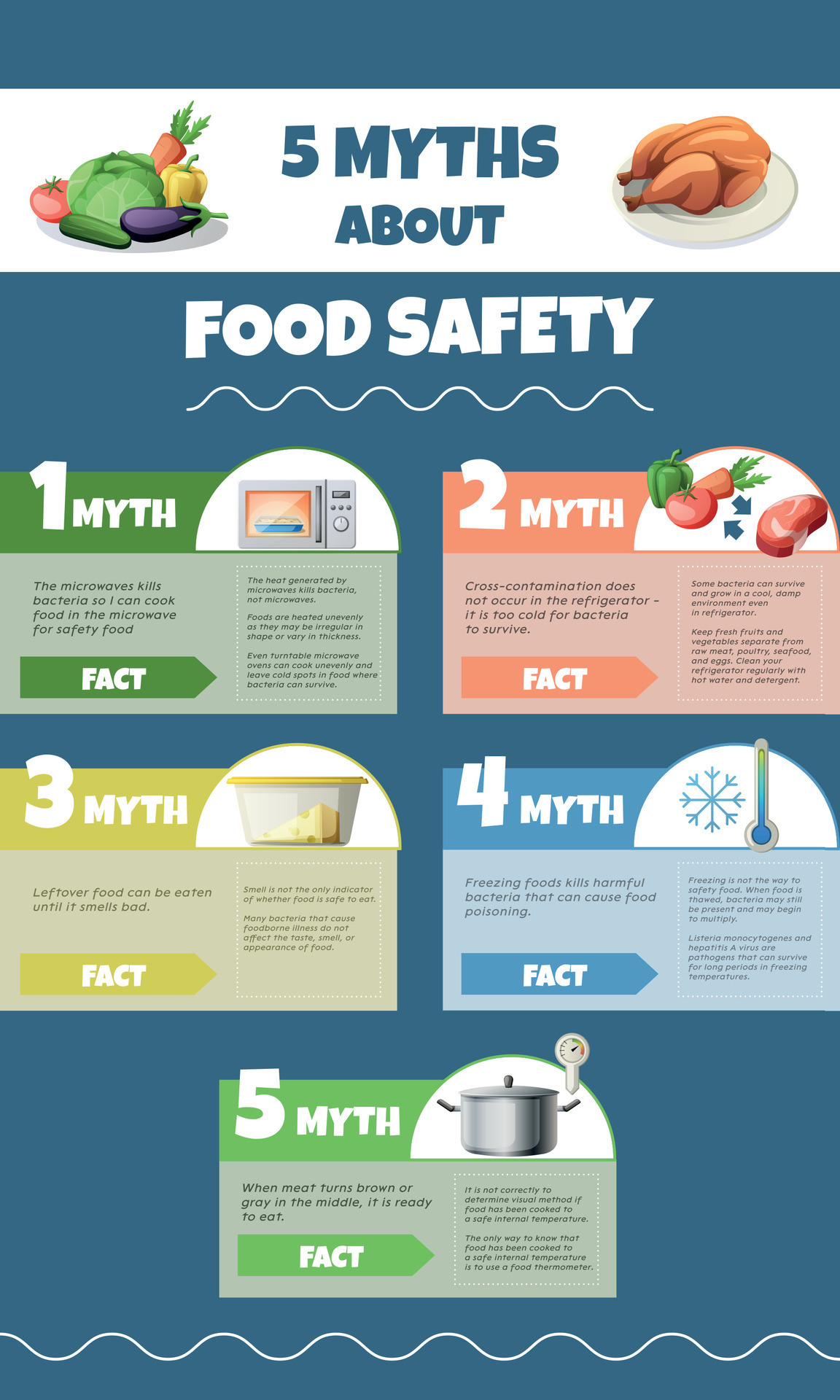


As World Food Safety Day 2024 approaches, it is important to understand the myths and facts surrounding food safety to ensure that everyone has access to safe and nutritious food. Contrary to popular belief, the smell or appearance of food does not determine its safety and washing raw poultry can actually spread harmful microorganisms. Thawing frozen foods at room temperature and consuming dropped food should also be avoided. Additionally, it is crucial to properly wash all types of food before consumption, including organic foods. Celebrate this day by informing yourself about effective food safety measures.
World Food Safety Day, observed annually on June 7th, aims to raise awareness about the importance of food safety and promote practices that ensure access to safe and nutritious food for all.
Food safety refers to the practices and conditions that prevent contamination and spoilage of food, reducing the risk of foodborne illnesses. Food can become contaminated through various sources, including:
Foodborne illnesses can cause a wide range of symptoms, from mild discomfort to severe health problems and even death. Vulnerable populations, such as children, pregnant women, and the elderly, are particularly at risk.
To ensure food safety, it is essential to dispel common myths and adhere to evidence-based practices:
Myth 1: You can tell if food is safe by its smell or appearance. Fact: The smell or appearance of food does not accurately indicate its safety. Some pathogenic microorganisms may not produce visible signs of spoilage.
Myth 2: You should wash raw poultry before cooking. Fact: Washing raw poultry can actually spread harmful microorganisms by splashing them around the kitchen. Cook poultry thoroughly to kill any pathogens.
Myth 3: It is safe to thaw frozen foods at room temperature. Fact: Thawing frozen foods at room temperature creates an ideal environment for bacteria to multiply. Thaw food safely in the refrigerator, cold water, or microwave.
Myth 4: You can eat food that has been dropped on the floor if you pick it up quickly. Fact: Food that has been dropped on the floor can pick up bacteria or other contaminants, even if it appears clean. Discard any food that has been dropped on the floor.
Myth 5: Organic food is safer than conventionally grown food. Fact: While organic food is grown without the use of synthetic pesticides, it can still become contaminated with microorganisms or other hazards during production, harvesting, or storage. All food should be washed thoroughly before consumption.
Q1: What is the most common cause of foodborne illness? A: Norovirus is the most commonly reported cause of foodborne illness in the United States.
Q2: What are the symptoms of a foodborne illness? A: Symptoms can include nausea, vomiting, diarrhea, abdominal pain, fever, and muscle aches.
Q3: How can I prevent foodborne illness? A: Follow basic food safety practices such as washing hands before handling food, cooking food thoroughly, avoiding cross-contamination, and refrigerating perishable foods promptly.
Q4: What should I do if I think I have a foodborne illness? A: Seek medical attention promptly. Inform your doctor about the foods you have eaten recently to help identify the source of contamination.
Q5: What is the role of World Food Safety Day? A: World Food Safety Day raises awareness about the importance of food safety and encourages governments, organizations, and individuals to take action to promote safe food practices.
By understanding the myths and facts about food safety and adhering to evidence-based practices, we can all contribute to ensuring a safe and nutritious food supply for everyone.

On the auspicious occasion of Bhai Dooj, Prime Minister Narendra Modi, Union Home Minister Amit Shah, and Union Health Minister JP Nadda extended their heartfelt wishes to the nation, celebrating the sacred bond between brothers and sisters. This festival, also known as Bhaiya Dooj, Bhai Tika, or Bhau Beej, is widely celebrated across India with love and festivity, symbolizing the unbreakable affection and dedication between siblings. The day holds great significance in Hindu mythology and is associated with the liberation of all living beings from suffering and the bestowal of happiness.

On Wednesday, April 30, Hindus will celebrate the auspicious festival of Akshay Tritiya, also known as Akha Teej. This day is believed to bring luck and success, and is considered free from all malefic effects. People often buy gold on this day as it is believed to bring prosperity and wealth in the future. Akshay Tritiya is also considered to be ruled by Lord Vishnu, who is a revered deity in Hinduism. The best time to buy gold on this day is between 06:11 AM and 02:12 PM, according to Drik Panchang.

As Diwali comes to a close, the festival of Bhai Dooj celebrates the unconditional love and bond between brothers and sisters with various names across India. This year, Bhai Dooj falls on October 23, with the tilak ceremony auspicious time from 1:14 PM to 3:29 PM. It is a time to cherish the cherished memories and create stronger relationships between siblings. Share heartfelt wishes and blessings on this day to celebrate the beautiful bond of love and togetherness.

Marking a historic moment, President Droupadi Murmu offered prayers at the Sabarimala Temple in Kerala, becoming the first serving state head to do so. She climbed the 18 sacred steps to reach the shrine and offered darshan to Lord Ayyappa, carrying the sacred bundle on her head. This visit holds symbolic significance as the president represents both Vaishnavism and Shaivism, making it a moment of unity in Hinduism.

As Diwali celebrations come to an end, the day after is marked by the auspicious festival of Govardhan Puja or Annakut. In 2025, this festival falls on Wednesday, 22 October, and is a reminder to express gratitude towards nature and the environment. Devotees prepare special offerings and decorate their homes with flowers and diyas, honoring Lord Krishna and the bounty of nature. While the article provides general guidance, it also urges readers to consult experts before implementing any beliefs or practices discussed.

The Udupi Catholic diocese has extended warm Diwali greetings, citing the festival as a symbol of moving from darkness to light, falsehood to truth, and death to new life. The diocese emphasizes India's diversity and unity in celebrating different festivals together. Sharing a symbolic story, the diocese urges people to be the candle of hope that relights peace, faith, and love in the world. The message concludes with a call to action to be the light that builds bridges of love, faith, and compassion.

The Hindu Vikram Samvat calendar marks October 22, 2025, as Gujarati New Year, a day of renewal, positivity, and joy for devotees. From early morning prayers to temple visits, sweets, and sharing warm messages, the day is a festive symbol of hope and abundance. As it falls a day after Diwali, it's also a time to open new accounts, perform rituals like Chopda Puja, and spread love, gratitude, and togetherness with family and friends.

As Diwali celebrations come to an end, Mumbai is facing a major problem of poor air quality. The city is engulfed in a thick layer of smog, with visibility reduced to minimal in some areas. The situation has been worsened by unseasonal rain, with no significant improvement in air quality. It is not just Mumbai, but several other cities in India are also dealing with pollution levels breaching the "very poor" and "severe" categories. With AQI readings hitting 380 in some areas, measures need to be taken to combat this worsening air quality situation.

Kiran Mazumdar-Shaw, founder of Indian biotech giant Biocon, met with top government officials in Karnataka, including Chief Minister Siddaramaiah, to discuss the city's deteriorating infrastructure. This follows a recent social media post where Shaw called out the government for their ineffective management and lack of accountability. With heavy rains expected in the coming days, these concerns take on even more urgency as residents brace for potential waterlogging and traffic congestion.

Hospitals in the city have reported an increase in burn cases linked to the celebration of Diwali, with over a hundred cases reported at AIIMS Delhi alone. Despite the worsening air pollution, no major increase in respiratory distress cases was seen, but senior doctors anticipate an increase in the coming days. Several patients who suffered burns during the festival recounted how even seemingly harmless firecrackers resulted in severe injuries. While most cases were minor, a total of 129 patients were treated for firecracker-related injuries at Safdarjung Hospital.